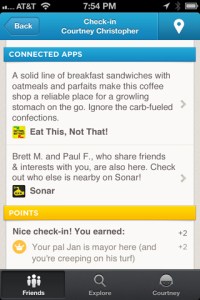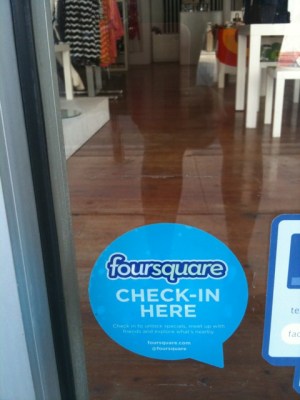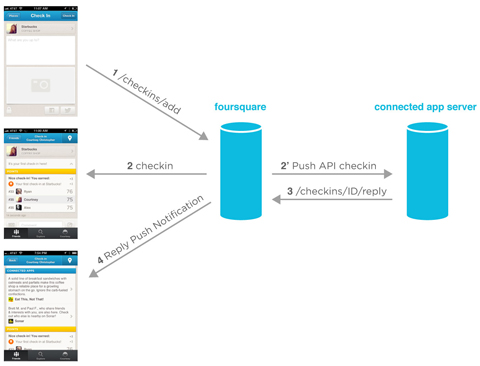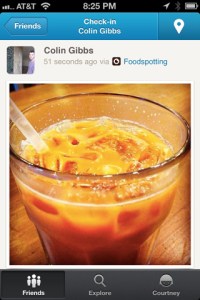The timing was horrendous – right in the middle of Google I/O – but location-based social network Foursquare announced a major change to its mobile platform this week which shouldn’t go unnoticed (even if it didn’t involve skydivers wearing futuristic eyewear). The company introduced a developer preview of what it’s calling its “next evolution” – Connected Apps. The new framework allows developers create their own experiences inside Foursquare, which enables them to connect with Foursquare users as events are happening. The result? Foursquare is setting itself up as mobile users’ go-to app for socializing around a location.
The platform announcement was accompanied by a list of preview partners, which are the first to have launched mini app experiences within Foursquare. For example, the social friend finder Sonar will tell you if you have friends nearby when you check in to a new venue. The Weather Channel can give you the current forecast when you check into the airport after landing. The full list includes the following apps:
- Eat This, Not That – From Men’s Health Mag, Eat This, Not That tells you what dishes to order and what to avoid at restaurants when you check in
- Untappd – Shows recommendations from friends and others on which beer to order, and easily check-in to beers from within foursquare
- Sonar – Informs you of your connections to interesting people nearby
- Soundtracking – Share and discover songs your friends have shared at a place
- Snoball – Trigger charity donations when you check in, and tells you about friends’ donations
- Foodspotting – Share and get recommendations on which dishes to order
- GroupMe – Makes it easier to share your check-in with a group of friends on GroupMe
- Blue Legends – Notifies you when you earn extra rewards for checking into Lufthansa venues
- Instagram – Share your Instagram photos on foursquare, which friends can see and tap through to the Instagram app
- Path – Share photos and text from Path, which tap through to the Path app
- The Weather Channel – Get the weather forecast with your first check-in of the day and when you check in to a new city
A New Reason To Check In
 The move is an interesting one for Foursquare to make especially after all the discussion about how it was taking the spotlight off of the check-in to focus on local discovery and recommendations. These in-app “experiences” are enabled by the check-in – that is, you’re provided with the information from your preferred Connected Apps after the check-in takes place. A new reason to check in, it seems? It’s more engaging than now-tiresome mayorship quests, points and badges, and it’s more predictable than the potential for a local offer or deal. And with users newly encouraged to check in, Foursquare can continue to grow its database of user check-ins to further power its friend-powered recommendations.
The move is an interesting one for Foursquare to make especially after all the discussion about how it was taking the spotlight off of the check-in to focus on local discovery and recommendations. These in-app “experiences” are enabled by the check-in – that is, you’re provided with the information from your preferred Connected Apps after the check-in takes place. A new reason to check in, it seems? It’s more engaging than now-tiresome mayorship quests, points and badges, and it’s more predictable than the potential for a local offer or deal. And with users newly encouraged to check in, Foursquare can continue to grow its database of user check-ins to further power its friend-powered recommendations.
But another notable piece to this equation is what it means for the app makers themselves. Foursquare, while already a platform in a sense that it offered an API and a way to build on top of its service, is now really an app platform. Users will be able to choose their “connected apps” from within the Foursquare application itself (this will be better highlighted for users within a few months’ time through an in-app gallery). They can then begin to discover the world around their location in new ways.
In addition, developers will also have the opportunity to re-engage users with their applications – applications which, let’s face it, often get forgotten on the backscreens of our iPhones and Androids after the initial attraction wears off. App developers will be in complete control of when and where to message users through the Foursquare application. That means you won’t see notifications about beers, or food, or nearby friends, or whatever else, unless it makes sense for you to do so. The notifications are timely, relevant, and less intrusive and/or spammy than OS-level push notifications.
Powering App Discovery
Not only will the app platform re-engage current app users, it will now also have the potential to power app discovery. Although the notifications users see will be private to them, their use of the application will be posted to the friend stream (Foursquare’s version of the Facebook News Feed). Friends can then see who among their friends is using the application and then tap on it to connect with it themselves. What’s more, “connecting” doesn’t necessarily mean having to install the app on your smartphone. New users will be able to sign up for an account with the application within Foursquare.
Some developers are using Facebook for sign-ups, much like they do with their native apps, while others are offering a faster sign-up through Foursquare’s own authentication mechanisms. Afterwards, users can tap through on the messages the apps share to see details in a web view within Foursquare, or they can choose to install the native application via the app store. (Currently Android and iOS are supported, but support for BlackBerry and Windows Phone is in the works). In the case where the app is installed, Foursquare will immediately switch them over to the appropriate app to continue their interactions within the application.
The interconnected app experience is a big step towards building a “web of apps” where apps, like their hyperlinked counterparts on the desktop web, move away from being isolated, self-contained, and solitary experiences. It’s worth mentioning that Foursquare isn’t the only platform moving to serve as a jumping off point into the mobile app universe – Facebook, too, has been positioning itself as a tool for app discovery in a number of ways. But while Facebook’s size and scope is unrivaled, Foursquare is setting itself up for an interesting niche in the future of the mobile/local/social web. Facebook is the network of people, but Foursquare’s Connected App platform could see itself turning into the network around places. For a service that’s struggling to remain relevant as the lure of gamification wears off and the local offers plan fizzles, becoming the go-to app for the location-based social web is not a bad position to take.


